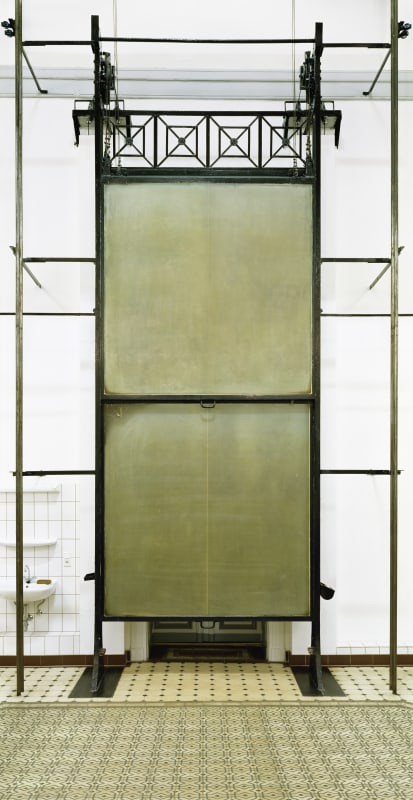Goldbach’s work explores the relationship between time and written language with an emphasis on photography as both material and metaphor. He appropriates material from philosophy and art to examine the intellectual history of how information is stored; the materiality of inscription in a conflicting world of digitized and technological reproduction. Goldbach came to prominence for his series of “Blackboards" and "Micrographs” for which he photographed chalkboards in rooms at various German universities where great thinkers such as Martin Heidegger and Theodor Adorno once taught. Concerned with philosophical ideas, Goldbach transcribes seminal philosophical texts in impossibly small pencil handwriting on paper or into the circuit board of a "Read Only Memory", yielding arduously intricate drawings and minimalist sculptures that hark back to outmoded forms of technology and highlight the materiality of information. More recent photographs experiment with the exposure and development processes in analogue photography, using torches, light filters and in collaboration with museums even original art works by Lucio Fontana to “draw” directly onto photographic paper and investigate the role of photography as a “Universal Language”, itself a philosophical and sociological concept.
In his most ambitious series of large-scale installations, "Lossless Compression", each work is made of an entire slide library from institutions such as Cologne University’s Institute of Art History or the New York University’s Institute of Fine Arts. Several 100,000 picture slides - photographic reproductions of art works representing over 2000 years of cultural history - are spread over the floor or stacked against the wall to form a three-dimensional mural with a flickering, random pattern.
Goldbach was born in Cologne in 1978 and studied Media Arts at the Academy of Media Arts in Cologne, Germany alongside Art History, Philosophy and Sociology at the University of Cologne. After a year spent in Japan, a stint as Assistant Professor of Photography at the Academy of Media Arts in Cologne and as a curator at the Simultanhalle Cologne, he received his doctorate in Art History in 2016. He has received numerous awards including a doctoral study scholarship from Studienstiftung des Deutschen Volkes, the Vordemberge Gildewart scholarship, ars viva prize for fine arts and also Q21 Residency at MuseumsQuartier Vienna.
Goldbach’s work is represented in important public collections and museums in Germany including: Museum Folkwang, Essen, Museum Kunstpalast, Düsseldorf, DZ Bank Kunststiftung, Frankfurt am Main, Kunsthalle Bremerhaven, Sprengel Museum, Hannover, Hessisches Landesmuseum, Museum Wiesbaden and internationally including the Centre Pompidou, Paris, Mudam Luxembourg, Freybe Collection, Vancouver, Canada amongst others.
